Consoler in chief: A president's response to a mass shooting is a defining moment
Beyond leading mourning, they've been frustrated pushing stricter gun laws.
The flag atop the White House on Monday had been raised from half-staff for less than a full day following last week's mass shooting in Atlanta when President Joe Biden had to order it lowered again to honor the mass shooting victims in Boulder, Colorado.
It was symbolic of how the nation turns to a president to lead the nation in mourning, but also, as these tragedies have become sadly more commonplace, a sign of how history shows a president has limited power to respond.
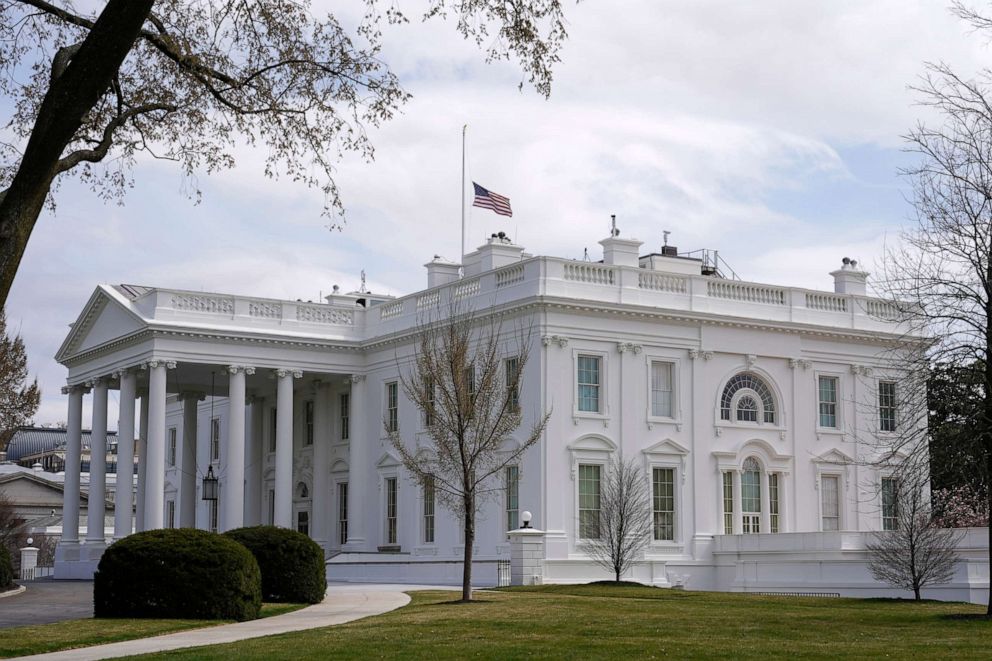
For the most part, presidents have addressed the nation, issued executive orders, and most memorably, visited the sites where the pain was still fresh, acting as consoler in chief, but they've often struggled to make changes that might stop the mass killings.
Obama: 'Saddest day of my presidency'
President Barack Obama's eight years in office were fraught with mass shootings.
He had to react at least 14 times, including after the 2012 massacre at Sandy Hook Elementary School in Newton, Connecticut, the 2012 movie theatre shooting in Aurora, Colorado, that killed 12 people and the 2016 Pulse Nightclub shooting in Orlando, Florida, that left 49 dead.
Just hours after the nation was shocked by the Sandy Hook shooting, in which 20 children and six educators were gunned down, Obama spoke teary-eyed from the White House.
"The majority of those who died today were children. Beautiful little kids between the ages of 5 and 10 years old," Obama said. "They had their entire lives ahead of them: birthdays, graduations, weddings, kids of their own. Among the fallen were also teachers, men and women who devoted their lives to helping our children fulfill their dreams. So, our hearts are broken today."
He eventually signed executive actions on gun control in 2013, intended to improve background check laws and ban military-style assault weapons and high-capacity ammunition magazines.
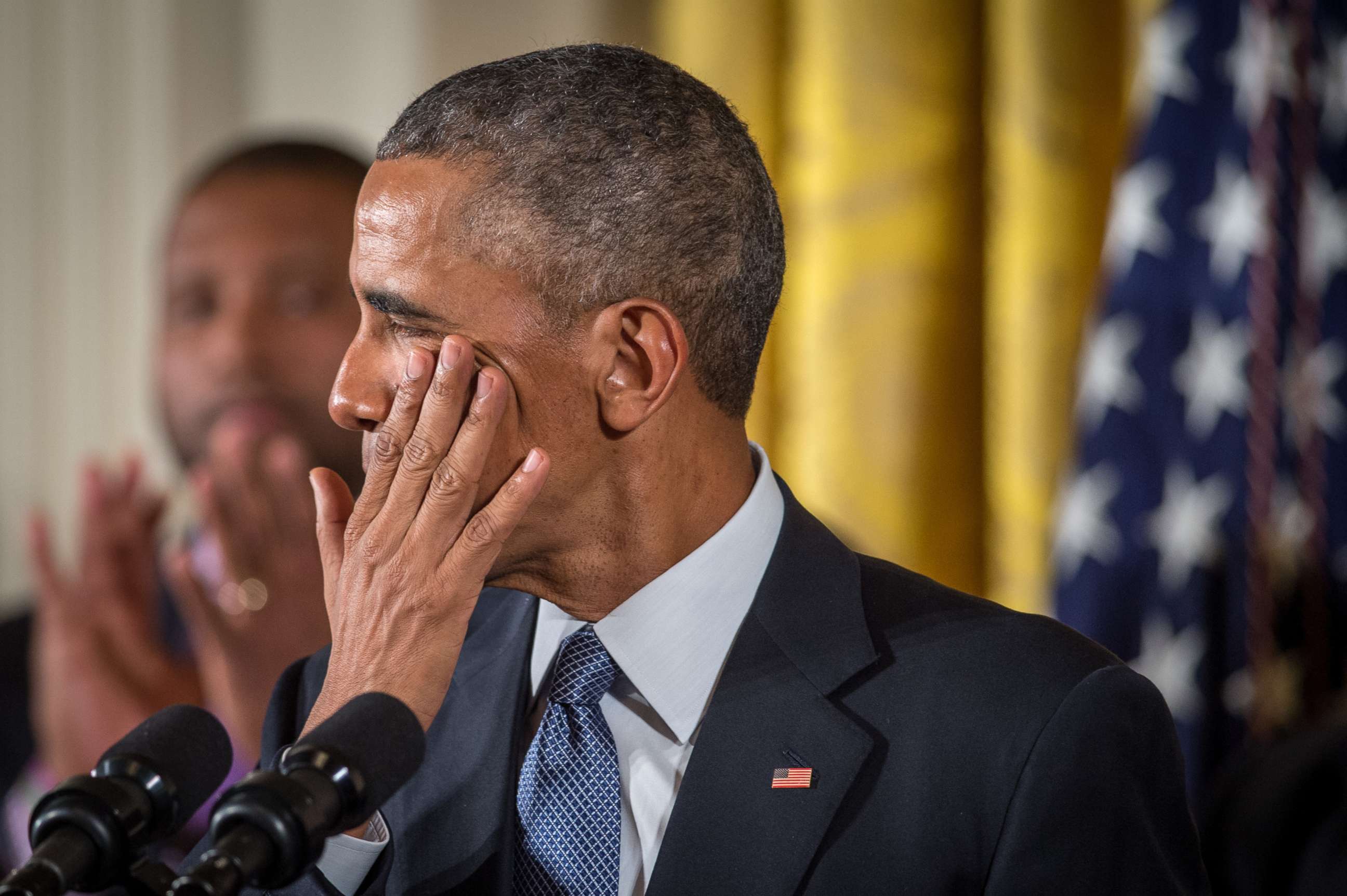
In 2016, surrounded by victims' families at the White House, he grew highly emotional pushing for change.
He backed two major bills, one from Sen. Diane Feinstein, D-Calif., which would have banned assault weapons, and a bipartisan bill put forward by Sens. Joe Manchin, D-W.Va., and Pat Toomey, R-Pa., which would have required universal background checks.
But both measures failed to pass.
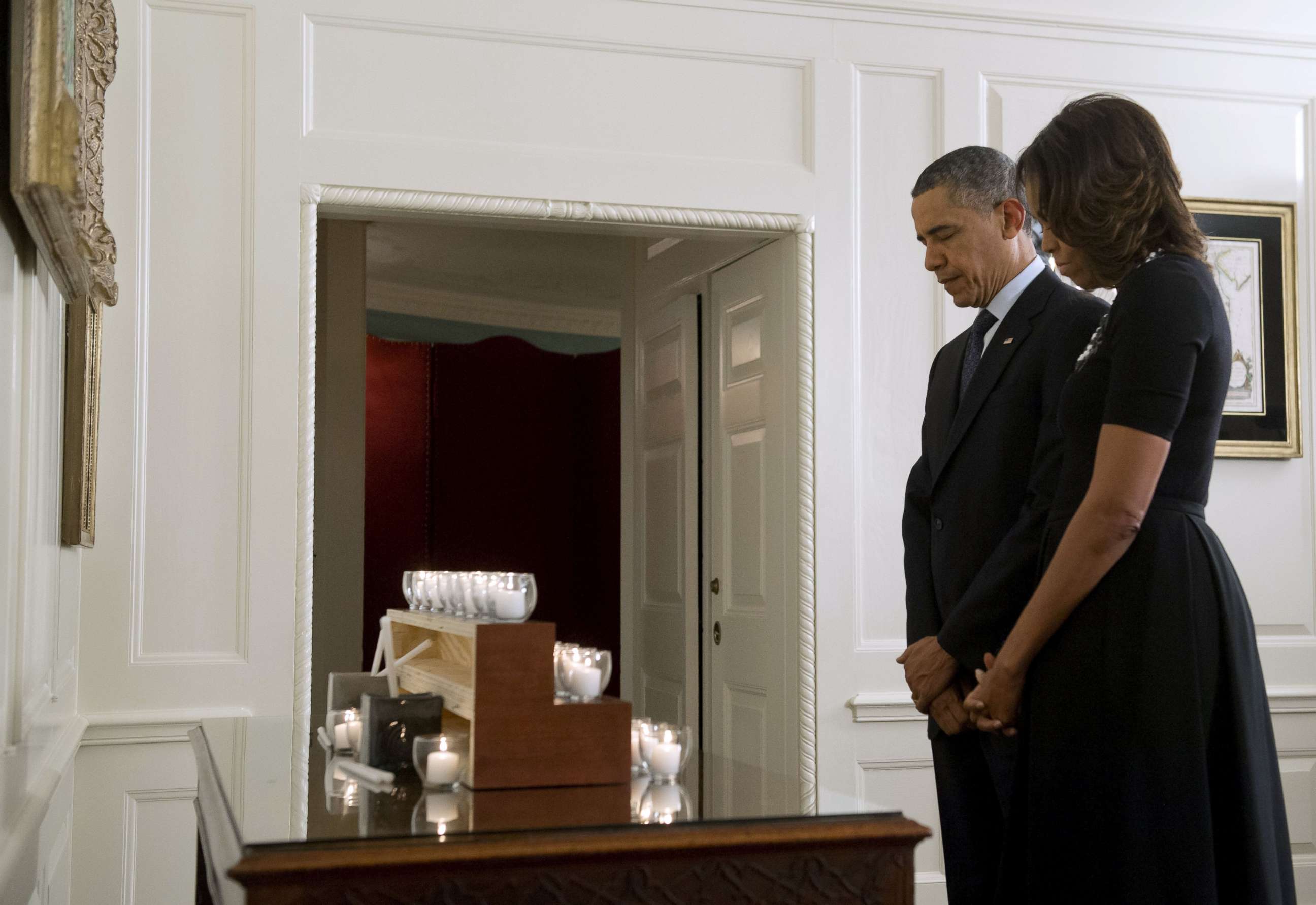
Years later, Obama spoke of his frustration in an interview with Oprah Winfrey.
"That was not only the saddest day of my presidency," Obama said. "But when Congress failed to do anything in the aftermath of Sandy Hook, that was the angriest I ever was in my presidency. I was disgusted and appalled by the inaction."
On Tuesday, Obama responded much the same to the shooting in Boulder.
"We can overcome opposition by cowardly politicians and the pressure of a gun lobby that opposes any limit on the ability of anyone to assemble an arsenal. We can, and we must," he said in a statement.
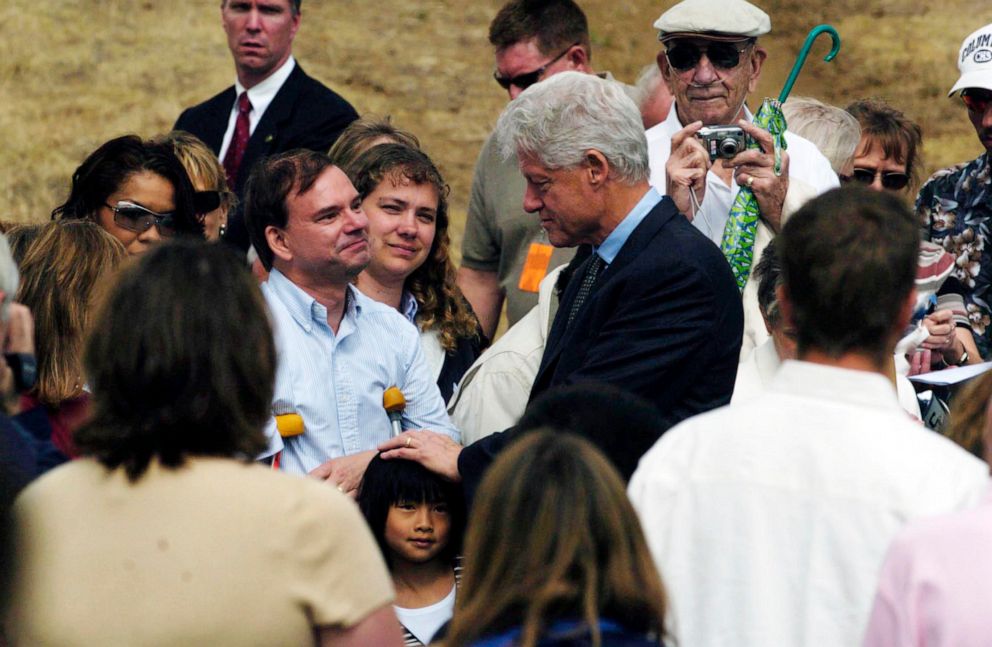
Clinton: The school shooting that shocked the world
The evening of the Columbine High School shooting in 1999, which left 12 dead in Littleton, Colorado, President Bill Clinton addressed the nation with sadness, quoting the Bible as solace for the victims.
He later visited Littleton and met with families and students who were at the school when the shooting happened.
Just weeks afterward, Clinton rolled out legislation that included tighter regulation on gun ownership and would hold parents liable for crimes committed by children with their guns.
Congress rejected the legislation shortly afterward, although he continued to push for other gun control measures.
Clinton's response as "consoler in chief" has been viewed as charting a course for presidents confronted with mass shootings.
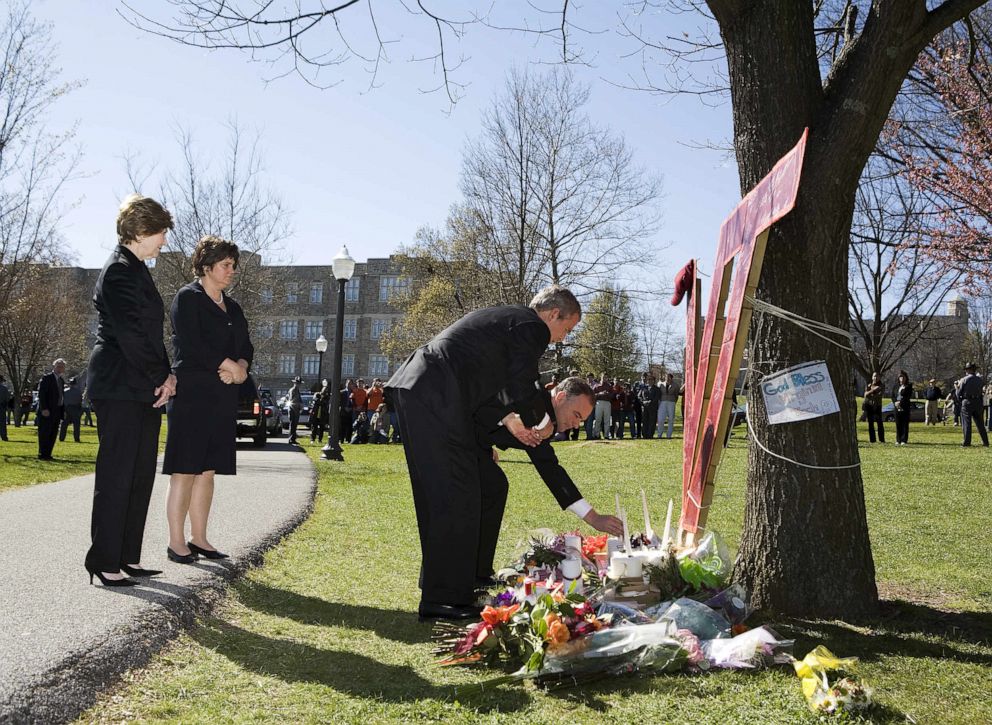
Bush: 'A day of sadness for our entire nation'
Less than a decade later, President George W. Bush found himself consoling aggrieved families after 32 people were killed in a 2007 mass shooting at Virginia Tech University in Blacksburg, Virginia.
Bush traveled to Blacksburg one day after the shooting, and delivered a somber speech divorced from politics.
"This is a day of mourning for the Virginia Tech community -- and it is a day of sadness for our entire nation," Bush said. "We've come to express our sympathy. In this time of anguish, I hope you know that people all over this country are thinking about you, and asking God to provide comfort for all who have been affected."
In late 2007, his administration got passed a new law that strengthened background check reporting data requirements for gun purchases.
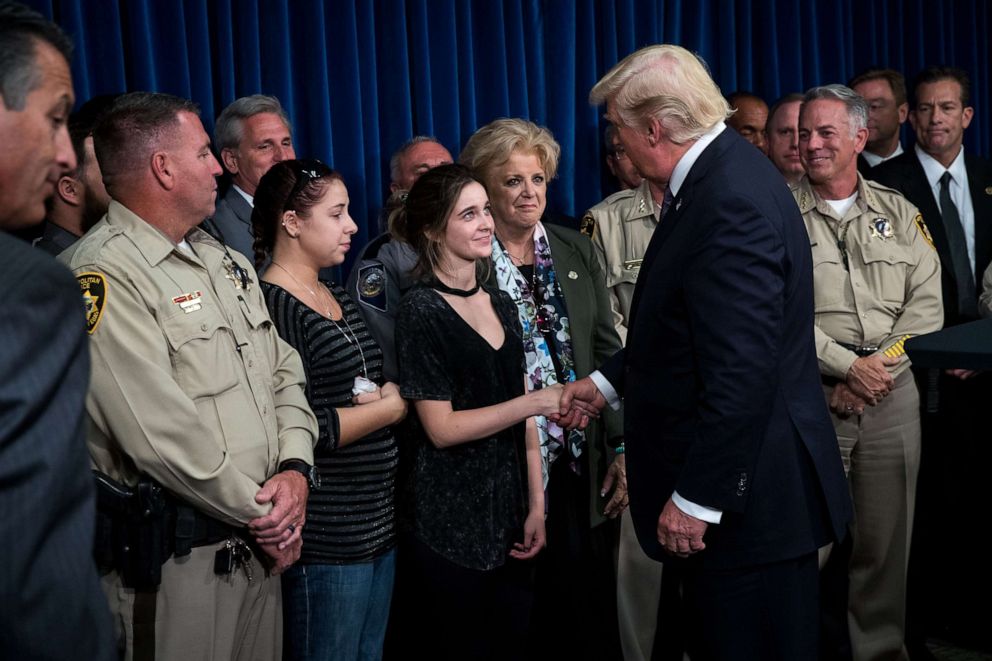
Trump: Victims should not 'die in vain'
President Donald Trump's tenure was also marked by mass shootings, including one at an outdoor concert in Las Vegas in 2017 that proved to be the deadliest in American history, killing 58 people and injuring hundreds.
Trump traveled to Las Vegas to speak to victims but largely avoided talking about gun control measures, which many of his supporters opposed. When asked during his visit about gun control, he said he was, "not going to talk about that today."
Months after the shooting, Trump ordered his attorney general to draft proposals to ban bump stocks -- devices that greatly increase capacity of weapons and contributed to the lethality of the Las Vegas shooting.
Trump also had to respond to the 2018 Marjory Stoneman Douglas high school shooting in Parkland, Florida, that claimed 17 lives, leading to nationwide protests and activists calling for stricter gun control measures.
In the wake of that attack, Trump met with families at the White House and held a listening session about their experiences and the reforms they wanted.
He vowed to act, but rather than trying to strengthen gun laws as former presidents worked to do, he instead called, as did the National Rifle Association, for teachers to be armed.
"When we declare our schools gun-free zones, it just puts our students in far more danger," Trump said.
Trump also spoke after two deadly shootings in 2019, one at a Walmart in El Paso, Texas, and another in Dayton, Ohio. In a tweet, the president called for stronger background checks.
“We cannot let those killed in El Paso, Texas, and Dayton, Ohio, die in vain," he tweeted.
But Trump did not push for similar reforms, and such proposals never made it into law.
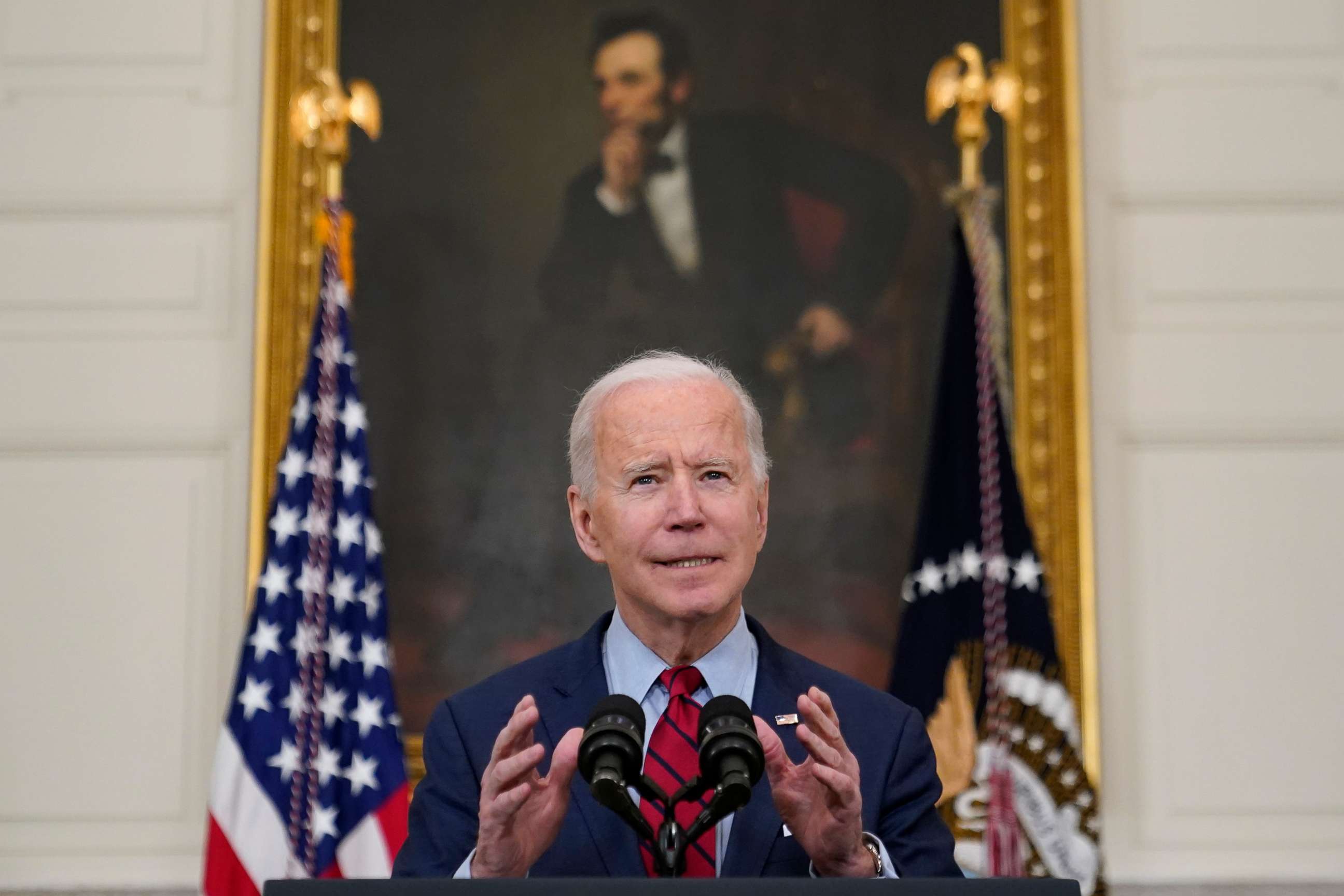
Biden: 'We have to act'
Now, just a little more than two months into Biden's presidency, he's been confronted by two mass shootings, one that killed eight in Atlanta-area spas and another less than a week later when 10 people were killed at a grocery store in Boulder.
Biden has the benefit of a slim Democratic Senate majority and the promise of a vote on two bills expanding background checks the House has passed with some bipartisan support, but he still faces an uphill political battle on an issue other presidents also failed to deliver on.
Biden also has touted legislation he helped craft as a senator with Sen. Diane Feinstein, D-Calif., that would ban assault weapons.
A 2019 ABC News/Washington Post poll found that that a 17-point majority of Americans support stricter gun control laws. That same poll found that measures like universal background checks garnered support from 89% of Americans, and "red flag" laws which would allow authorities to take guns from people judges deemed to be a danger have support of 86% of Americans.
A Gallup poll this year showed 58% of Americans were dissatisfied with U.S. gun laws.
Republican Sen. Ted Cruz of Texas mocked the proposals from Biden and Democrats at a Senate Judiciary Committee hearing on how to stop gun violence.
"[E]very time there’s a shooting, we play this ridiculous theater where this committee gets together and proposes a bunch of laws that would do nothing to stop these murders," Cruz said.
"What happens in this committee after every mass shooting is Democrats propose taking away guns from law abiding citizens because that's their political objective," Cruz said. "But what they propose not only does it not reduce crime, it makes it worse."
White House press secretary Jen Psaki said in a briefing Wednesday that Biden is still weighing his policy options, including on whether to take executive action, but she said any proposed reforms will be "common sense" and not jeopardize gun ownership rights.
"No one is talking about overturning or changing the Second Amendment," Psaki said. "What our focus is on is putting in place commonsense measures that will make our communities safer, make families safer, make kids safer. The majority of the American public supports background checks. The majority of the American public does not believe that anyone needs to have an assault weapon. So, that’s really what our focus is on at this point in time."
She said Biden has no current plans to visit Boulder.
ABC News' Molly Nagle, Elizabeth Thomas and Meghan Keneally contributed to this report.




